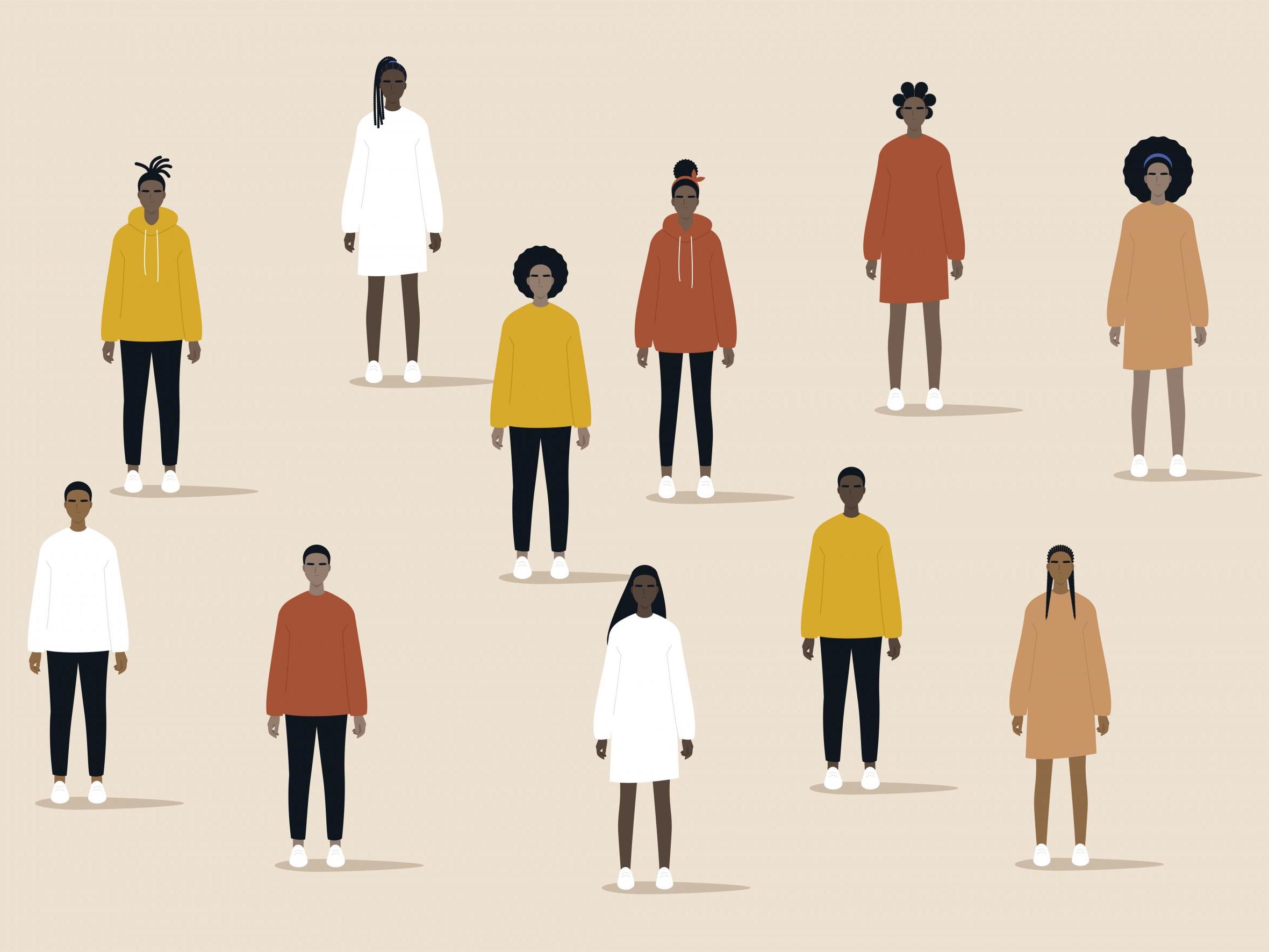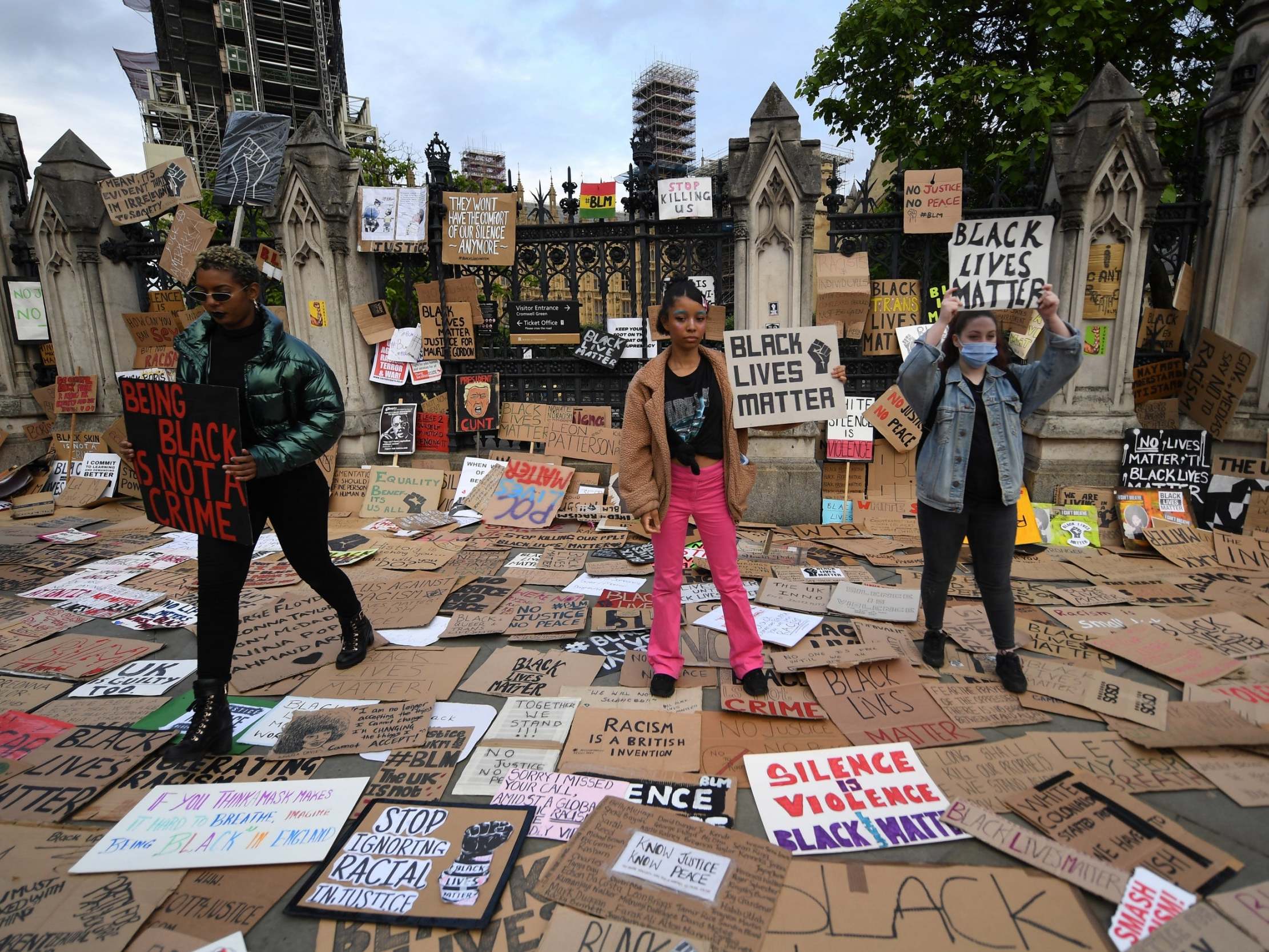Boris Johnson says the UK isn’t a racist country. Black Britons disagree
There are 4,000 miles between the UK and Minneapolis, where George Floyd was killed by police on 25 May, but Micha Frazer-Carroll says there is little distance in black people's experience of racism


Your support helps us to tell the story
From reproductive rights to climate change to Big Tech, The Independent is on the ground when the story is developing. Whether it's investigating the financials of Elon Musk's pro-Trump PAC or producing our latest documentary, 'The A Word', which shines a light on the American women fighting for reproductive rights, we know how important it is to parse out the facts from the messaging.
At such a critical moment in US history, we need reporters on the ground. Your donation allows us to keep sending journalists to speak to both sides of the story.
The Independent is trusted by Americans across the entire political spectrum. And unlike many other quality news outlets, we choose not to lock Americans out of our reporting and analysis with paywalls. We believe quality journalism should be available to everyone, paid for by those who can afford it.
Your support makes all the difference.Jason Osamade Okundaye, 23, from London didn’t expect to see his face in the newspaper that morning. He was just your average Cambridge university student. The night before he had been tweeting with his friends about Rashan Charles; whose death on 22 July 2017, while being chased by police in east London, became the subject of an Independent Police Complaints Commission (IPCC) investigation. Without realising, he was about to become part of a growing club of black students smeared by the press for speaking about racism in modern Britain.
“I wrote a thread about how racism in the UK is frequently presented as a working-class phenomenon associated with Brexiteers outside of London,” Osamade Okundaye, who was president of the university Black and Minority Ethnic society at the time, tells The Independent. “Countering that, I wrote that ‘all white people are racist’ to describe the idea that white people can be racist regardless of their class, gender sexuality. It was the night of protests and I was, as I tend to do, ranting about racism, and supporting the protestors.”
Photographs of him wearing a snapback and a sweatshirt were soon collated in newspapers next to images of protests, violence and rioting related to Charles’ death. “I was plastered all over the national press for expressing an opinion online,” he says. He received death threats, rape threats and was outed as gay to his family. “It was a really frightening experience.”
Since the murder of George Floyd, at the hands of police in Minneapolis on 25 May 2020, many global brands and white-owned businesses have tweeted similar sentiments to Osamade Okundaye, but without the backlash. Some have been called hypocritical: L’Oreal was widely criticised for sharing a black square on #BlackOutTuesday after firing black activist Munroe Bergdorf in 2017, when she said: “Honestly I don’t have energy to talk about the racial violence of white people any more. Yes ALL white people.”
On Monday 8 June, a spokesperson for the prime minister said Boris Johnson believes Britain “is not a racist country”. It is a common defence of racism-sceptics in Britain – that anti-black sentiment is an “American issue”. Discussing police brutality with George the Poet on BBC’s Newsnight last week, Emily Maitlis asked: “Our police aren’t armed, they don’t have guns, the legacy of slavery is not the same…it’s not the same is it?”
Racism is structural and perpetuates inequalities that see black people severely disadvantaged in every area of their lives...
Nadine White, a journalist specialising in race, says she sees racism in the US and the UK as the same. “Racism is structural and perpetuates inequalities that see black people severely disadvantaged in every area of their lives – from healthcare and education to the public sector and policing,” she says.
Black people are more than twice as likely to die in police custody, and an independent review of deaths in police custody found that between 1990 and 2009, 16 per cent of those who died after the use of force were black – more than twice the proportion arrested. Stop and search tactics disproportionately target young black men, a fact even acknowledged by the Home Office. The future of policing is already showing racist tendencies with facial recognition software, rolled out across London in January 2020, widely regarded as profiling based on race.
When Mark Duggan was killed by a police officer in Tottenham in 2011, the British press called him a “thug” and a “gangster”. This week, we’re seeing the same stereotype play out in the portrayal of Black Lives Matter protestors, who have been described as “thuggish”, “mobs”, “hooligans” and “criminals” for organising around racial justice. Language used in the coverage of Meghan Markle compared to Kate Middleton was frequently cited as a clear example of British racism; the former was criticised for everything from eating an avocado to cradling her baby bump. It became so widespread that Kensington Palace issued a statement condemning it.
White argues that racism is embedded in British structures, institutions and ideologies. “I’ve covered so many cases of systemic inequalities from racism and discrimination across the education system (hair discrimination and racist textbooks) to ongoing concerns of Afriphobia in the Labour Party,” she says. A British Social Attitudes survey in 2014 showed more than 30 per cent of people openly admitted to being a “little” prejudiced.
The Windrush scandal in 2018 was emblematic of how these attitudes are entrenched in systemic anti-black racism. The Home Office oversaw hundreds of black Brits wrongly targeted by immigration enforcement as a result of the government’s “hostile environment” policies. As a result, many elderly people were suddenly being barred from working, refused access to government services, and lost access to welfare benefits.

Two years later the coronavirus pandemic sees black people four times more likely to die of the virus than their white counterparts; a higher proportion of black pregnant women admitted to hospital with Covid-19; and more than 6 in 10 of dead NHS staff coming from BAME backgrounds, highlighting the extent of structural racism in our healthcare system.
White says: “I have lost family and friends to the pandemic, in quick succession, and many of them were living on low income, worked on the frontline and some lived with pre-existing health conditions exacerbated by the former.”
Even single events, such as the treatment of Belly Mujinga, a black TfL worker at Victoria station, who died from Covid-19 after being spat on, illustrate how black people are treated differently. British Transport Police (BTP) said no further action would be taken against the perpetrator in Mujinga’s case because there was "no evidence to substantiate any criminal offences", while other examples of spitting at security guards and ASDA workers have seen prison sentences of up to 13 months.
Kimberly McIntosh, policy officer at race equality thinktank The Runnymede Trust, says that the common misconception that race is an “American problem” – particularly due to a “different” legacy of slavery – is closely related to education. “The Department for Education admitted in 2014 that it did not know how many schools were teaching the slave trade and the enslavement of Africans,” she says.
How can we begin to understand the extent of racism in the UK without teaching and acknowledging Britain’s role in initiating the slave trade?
McIntosh continues: “How can we begin to understand the extent of racism in the UK without teaching and acknowledging Britain’s role in initiating the slave trade, enforcing slavery in her colonies for over 200 years and the legacy it has left us with?”
She points to slavery as the source of so much present-day racist ideology. For example, the pervasive idea that black people are criminal, brutish or feel less pain. “In 2017, NatCen and Runnymede Trust found that 44 per cent of those surveyed believed some races are born harder working than others, and 18 per cent believe some races are born less intelligent than others. Until we publicly interrogate this – through our curriculum and who we choose to commemorate – our collective amnesia will continue.”
The idea that Britain isn’t racist is another example of British exceptionalism that fails to acknowledge how our history interacts with the present, says White. “Racism in the UK is an ongoing issue that is often hidden behind a veneer of respectability. It is a fallacy that it is rife in the US but not here. The ‘fact’ that the UK is the ‘most tolerant country in Europe’, and the ‘least racist’ country is inconsequential: racism is racism and it is an ongoing problem in the UK.”
White says non-black allies must actively interrogate their own lives, and any role they might play in upholding racist structures. She says: “How many black people do they interact with, who is in their circle? How many black friends and associates do they have? How aware are they of black people’s lived experiences? Do they have conversations about it or discuss race with them at all? How many books by black authors do they own? All meaningful journeys towards betterment start with self.”
It has been 27 years since the death of Stephen Lawrence and the subsequent-publication of the McPherson report, which detailed the depths of institutional racism in Britain. Despite politicians’ protestations that the UK has moved into a new post-racism chapter, Black Britain does not agree.
Join our commenting forum
Join thought-provoking conversations, follow other Independent readers and see their replies
Comments